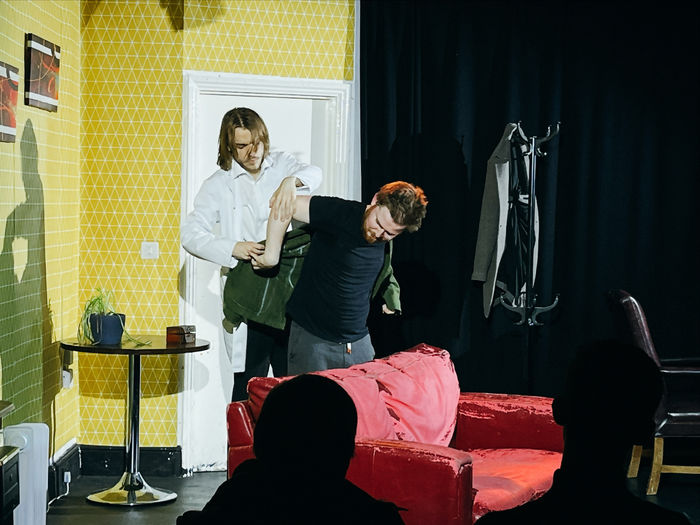There are no animals in Heart of a Dog
This adaptation of Bulgakov’s novella explores the absurdity of everyday life through the zany lens of mad science

Heart of a Dog is not a fashionable show. Its campy absurdist depiction of an ordinary dog transformed into an ordinary man (and back again) is crammed into a garishly wallpapered Soviet apartment. Nor is it an especially culturally salient one. Bulgakov’s biting satire of his contemporary Bolshevism is steeped in historical particularities – an endless reel of corrupt officials berate Philip Philipovich for his bourgeois seven room apartment-slash-medical practice, placated only with pills. What it is, then, is a delightful theatrical experience which left me musing on the absurdities of the common human experience.
“A delightful theatrical experience which left me musing on the absurdities of the common human experience”
Transformative surgery plucks a dog (James Wilson) from the canine realm and dumps him, unclothed and unprepared, into our human society: a society which expects him to be bathed and mannered and potty trained. How silly it all seems when demanded of a dog! In brief, frozen tableaux, illuminated by harsh surgical light, Philip brandishes silver scalpels and big, shiny hearts. In the intimacy of the Corpus Playroom we hear the cast giggle and scurry about between freeze frames as they bring this silly monstrosity to life. Heart of a Dog’s visual effects tend towards the cartoonishly cinematic, the effect here most reminiscent of a feature film montage undercut by the obviousness of the effort necessary to represent this on stage. Philip’s potentially grotesque experiments, shrouded in slapstick physical comedy, take on a desperate and pathetic tone.
The violence of Philip’s manic operations is comically surreal, none of it of much consequence in the topsy-turvy post-revolutionary world. Miles Hitchens’ Philipovich stomps and squints and rolls his eyes, his pupils expressive. He throws his arms and legs and, at one point, a stack of paper about the stage as he dances between the unhinged and God-like urge to push boundaries of science and the straight man voice of reason he becomes as he fosters the Dog into humanity. The show could have tended towards Frankenstein-like horror as Philip offends the natural order of life and death. Instead, the silly surreality it treats its subject matter with focuses more on the mundanities of mad science.
“It feels as if Hitchens is Philipovich, reanimating the novella into something new with its own spirit”
Its title misleads: despite its zany premise, Heart of a Dog has more human concerns. Even pre-transformation the Dog has rational and human worries, musing intellectually about his place in the doggy class system. Content to live as a gentleman’s pet, it is only after he achieves manhood that he falls prey to his animalistic tendencies. The Dog straddles the line between human and animal, lacking the paperwork to get his own apartment. Bureaucracy renders him nothing more than a mutt, though the show tells us that really there are no animals here. There are not even any to eat: the show feeds on shiny plastic prop meats. A glistening roast chicken hits Philip and his assistant Zina’s ramshackle table with a plastic thuck. A long chain of maroon sausages connects Philip and the Dog like an umbilical cord as he lures him to apparent safety.
Hitchens’ adaptation of Bulgakov’s novella betrays a lot of love for its source material. It feels as if Hitchens is Philipovich, reanimating the novella into something new with its own spirit. Writing, directing, and starring as deranged doctor Philipovich, it struck me that Hitchens is to Heart of a Dog what Orson Wells was to Citizen Kane. The comparison between these two very disparate works goes deeper. Philip’s ambitious pursuit to combine two contrasting states of being parallels Charles Foster Kane’s Murdoch-esque dreams. Macbethian overarching ambition leads to the downfall of the two protagonists – although Philip’s conclusion is a bathetic one.
Citizen Kane, with its leading man’s taste for luxurious excess and individualist triumph, is a distinctly American story. Heart of a Dog’s satire of the absurd hypocrisies of the Soviet era is ingrained in the rich canon of Russian literature. You would be hard pressed to find two nations more directly contrasted in recent history, but the similarity here suggests a commonality to our experience. More can be uncovered by considering An Ideal Husband, which shares a set with Heart of a Dog. The garish yellow wallpaper that jackets Philip’s mad scientist lair (and occasional dining room) doubles as the oppressive domestic wrapping paper of An Ideal Husband, which finds itself across time and the Atlantic ocean in 1970s America. Heart of a Dog, beyond its goofily pointed political satire, points to a more universal conclusion about the ridiculousness of ordinary life that transcends time and place and culture. Be it Bolsheviks or stray dogs, something always trips us up.
 Features / Should I stay or should I go? Cambridge students and alumni reflect on how their memories stay with them15 December 2025
Features / Should I stay or should I go? Cambridge students and alumni reflect on how their memories stay with them15 December 2025 News / Cambridge study finds students learn better with notes than AI13 December 2025
News / Cambridge study finds students learn better with notes than AI13 December 2025 News / Dons warn PM about Vet School closure16 December 2025
News / Dons warn PM about Vet School closure16 December 2025 News / News In Brief: Michaelmas marriages, monogamous mammals, and messaging manipulation15 December 2025
News / News In Brief: Michaelmas marriages, monogamous mammals, and messaging manipulation15 December 2025 Comment / The magic of an eight-week term15 December 2025
Comment / The magic of an eight-week term15 December 2025









